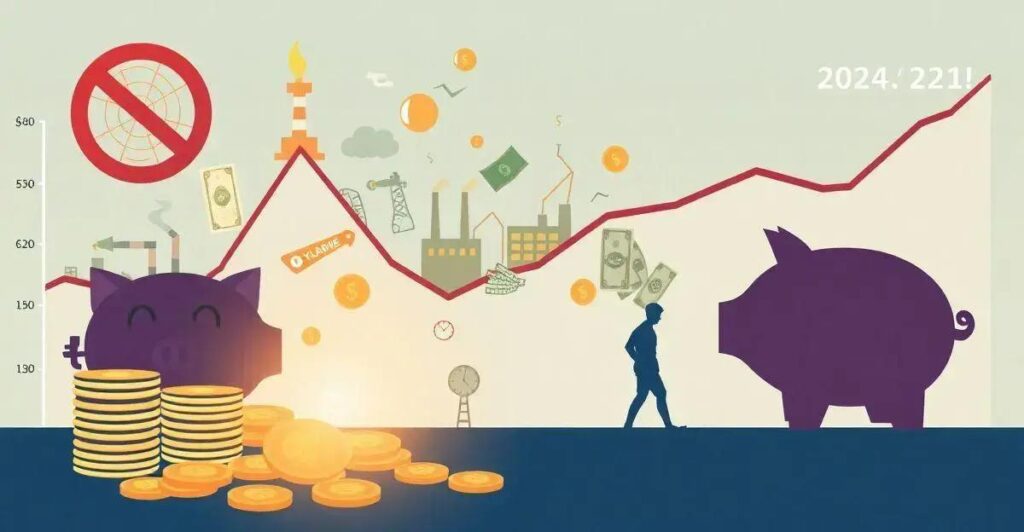Inflation rates are on the rise, and it’s essential to understand what’s driving them.
With prices increasing, your money’s purchasing power is diminishing.
In this post, we’ll delve into the latest inflation rates updates, explore the causes, and provide tips on how to protect your money from inflation’s impact.
Whether you’re an investor, a consumer, or a business owner, it’s crucial to stay informed about inflation rates and their effects on the economy.
Inflation Rates: What’s Next?
Conteúdo não disponível
The Causes of Inflation Rates

The causes of inflation rates are multifaceted and complex, involving a combination of monetary policy, economic growth, and supply and demand imbalances.
When the economy is growing rapidly, aggregate demand may exceed the available supply of goods and services, leading to price increases.
Similarly, changes in global trade policies, natural disasters, and supply chain disruptions can also contribute to inflation.
In addition, the impact of inflation on the economy can be exacerbated by factors such as low interest rates, high government spending, and a strong labor market.
Understanding these causes is crucial to developing effective strategies to mitigate inflation’s impact.
Inflation Rates and Your Money
Inflation rates have a significant impact on your money’s purchasing power. As prices rise, the value of your money decreases, making it essential to understand how inflation rates affect your financial decisions.
For individuals, inflation rates can affect their standard of living, making it challenging to save and invest. For businesses, inflation rates can impact their profitability, making it crucial to adjust pricing strategies and costs accordingly.
By understanding how inflation rates affect your money, you can make informed decisions about your financial future.
Protecting Your Money from Inflation

Protecting your money from inflation requires a comprehensive approach that involves financial planning, smart investing, and strategic cost management.
One effective way to shield your wealth is to diversify your investments, allocating a portion of your portfolio to assets that historically perform well during periods of inflation.
Additionally, adopting a long-term investment approach and avoiding emotional decision-making can help you ride out inflation’s impact.
Furthermore, maintaining a cash reserve and considering inflation-indexed instruments can provide a hedge against inflation’s effects.
By taking a proactive approach to protecting your money from inflation, you can ensure your financial security and achieve your long-term goals.
Inflation Rates: Historical Perspective
Inflation rates have a long history of fluctuating, with periods of high inflation followed by periods of low inflation.
Understanding the historical context of inflation rates can provide valuable insights into the causes and consequences of inflation.
By studying the past, we can better prepare for future inflationary periods and develop effective strategies to mitigate their impact.
For example, the 1970s saw a period of high inflation, driven by monetary policy and economic growth.
In response, central banks and governments implemented policies to reduce inflation, such as raising interest rates and reducing government spending.
Today, we can apply these lessons to better understand and respond to current inflationary pressures.
The Impact of Inflation Rates on the Economy

Inflation rates have a significant impact on the economy, affecting everything from business profitability to individual standard of living.
High inflation rates can lead to reduced consumer spending, as prices rise and purchasing power decreases. This can have a ripple effect throughout the economy, impacting businesses and industries.
On the other hand, low inflation rates can lead to reduced economic growth, as consumers and businesses become more cautious with their spending.
Understanding the impact of inflation rates on the economy is crucial to developing effective monetary policies and making informed economic decisions.
By analyzing the effects of inflation on different industries and sectors, we can gain valuable insights into the complex relationships between inflation, economic growth, and consumer behavior.
Frequently Asked Questions about Artificial Intelligence for Small Businesses
What are the benefits of automating tasks for my small business?
Automating tasks frees up your team from repetitive tasks, increasing productivity and allowing them to focus on more strategic activities.
Which tools can I use for data analysis?
There are various tools available, such as Google Analytics, Tableau, and Microsoft Power BI, that help collect and interpret valuable data.
What are chatbots and how do they improve customer service?
Chatbots are virtual assistants that can answer questions and resolve problems 24/7, improving the customer experience and freeing up your team.
How can I personalize the customer experience?
Through data analysis, you can better understand customer preferences and offer personalized recommendations and promotions.
Why is customer feedback important?
Feedback is essential to identify areas that need improvement and adjust your strategy to ensure customer satisfaction.
Is artificial intelligence accessible to small businesses?
Yes, there are various AI solutions that are accessible and scalable for small businesses to improve efficiency and customer service.



